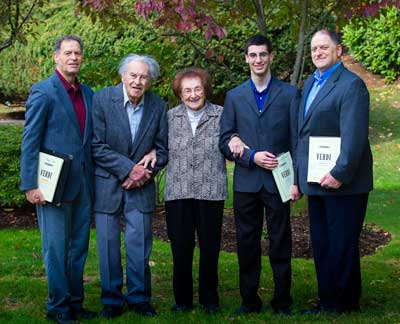Concert
Murry Sidlin, creator & conductor
Jeremiah Kissel and Will LeBow, actors
Aga Mikolaj, soprano
Ann McMahon Quintero, mezzo-soprano
Marc Heller, tenor
Nathan Stark, bass
Orchestra of Terezín Remembrance
Tanglewood Festival Chorus
John Oliver, conductor
Presented by The Defiant Requiem Foundation. Performed in honor of Edgar and Hana Krasa.
Symphony Hall, Boston, MA
April 27, 2015
8:00pm

who will be honored at the concert,
with their sons and grandson,
who are scheduled to sing in it
Photo: Michael J. Lutch
In 1994, Murry Sidlin, a successful symphony conductor who had been music director of the Long Beach, New Haven and Oregon symphony orchestras, was passing a remainder table in front of a bookstore in Minneapolis. He happened upon a “primer” on music at Terezín, the Nazi concentration camp in Czechoslovakia where for several years the arts flourished in a remarkable and unexpected way. One story in particular captivated him, that of Rafael Schächter, a pianist and choral director who mounted sixteen performances of Verdi’s masterful but very challenging Requiem. Knowing the complexity of the work and curious how such a feat could be accomplished under such trying circumstances, Sidlin sought out Schächter’s relatives in Israel who led him, by a series of lucky turns, to Edgar Krasa, who in turn subsequently connected Sidlin with other members of the chorus. The Defiant Requiem project began to take shape.
The seventieth anniversary of the liberation of Auschwitz fell on January 27, which coincided with International Holocaust Remembrance Day. In commemoration, Sidlin and The Defiant Requiem Foundation intended to present a program at Boston’s Symphony Hall on January 27 that featured Verdi’s Requiem, along with supplementary filmed and dramatic components. (Due to snow, the event was rescheduled for April 27.) The event is meant to vividly invoke the spirit of the performances done at the Terezín concentration camp during 1942-1943.
Those performances at Terezín were led by that remarkable maestro, Rafael Schächter, who tragically perished on a death march from Auschwitz in 1945 very near the end of the war. Edgar Krasa, now in his 90s and a resident of Newton, was a member of that original chorus at Terezín and participated in all of the performances of the Requiem there under Schächter’s direction. He and his wife, Hana, also an inmate at Terezín, will attend, and are being honored at, the concert at Symphony Hall.
Sidlin, who was in Vienna to arrange for a future performance of the program there, and Krasa, from his home in Newton, were interviewed for this article.
Sidlin remembers vividly when, as a young Jewish boy growing up in Baltimore, a letter arrived describing his grandmother’s fate, near Riga, Latvia, at the hands of the Nazis. The shock and pain of those revelations reverberated quietly for many years, but clearly found a resonant connection in the story of Schächter and the Terezín chorus, which so fervently set itself to master and present the Verdi masterpiece. As importantly, that effort conveyed, through its Latin text devoted to divine retribution, a consciously defiant stance towards the Nazis.
Having packed the piano score of the Requiem into the 110 lbs. of allotted luggage, and believing that, “we can sing things to them we can’t say,” Schächter proceeded to teach the chorus all the music and Latin words — by heart. When, after several performances, the chorus was cut in half by deportations, new members were brought in and taught the score anew.
Asked when Schächter recruited him for the chorus, Krasa responded wryly “I recruited him.” As a twenty-one-year-old, having trained as a chef, Krasa arranged to work at Terezín to protect his parents from being deported, calling that now “meshugah.” “Rafi,” as Krasa (and other members of the chorus) affectionately call Schächter, came later, and became a dear friend and a deeply inspiring influence. Eventually the two shared an attic room together at Terezín. Krasa named his first son, now middle-aged, after him. (Both of Krasa’s sons and his grandson will be joining the chorus at Symphony Hall on the 27th.)
Between 1942 and 1944, there was much artistic and intellectual activity at Terezín, including 2,400 lectures, 1,000 concerts, many theatrical productions and even the formation of a band called The Ghetto Swingers. Schächter’s chorus and its inspired performances of the Requiem were emblematic of that outpouring of creativity, and particularly signify a bold attempt to defy the Nazis, with voices raised in ecclesiastical Latin.
An evocative and informative documentary film, Defiant Requiem (2012), includes interviews with Sidlin, Krasa and other members of the Terezín chorus, who all describe the manifold ways in which they were emboldened, heartened and reassured by the music and by its message. They describe their participation in the chorus as “not entertainment — but a fight for life.” When, at one point, according to Krasa, Schächter conveyed to members of the chorus the danger in singing defiant lyrics that might at any time be decoded by the Nazis and gave them the option to leave the chorus, not one did.
As conceived by Sidlin, these current performances of Verdi’s Requiem not only invoke the inherent qualities of that great music, but also include a particularly vivid sense of the meanings embodied in the memory of those, like Krasa, who participated in performing it, courageously and wholeheartedly, under the very worst of circumstances.
– Originally published, in a slightly modified version, in the January 15, 2015 issue of ‘The Jewish Journal of the North Shore’ as
“‘Defiant Requiem: Verdi at Terezin’ at Symphony Hall”
by Charles Munitz (aka BADMan)
Leave a Reply